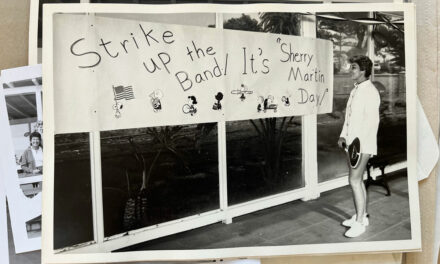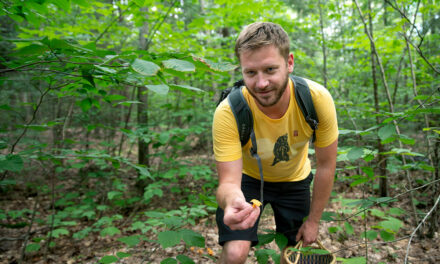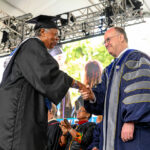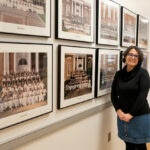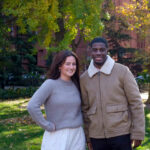
Bridging the Gulf between Man and Man
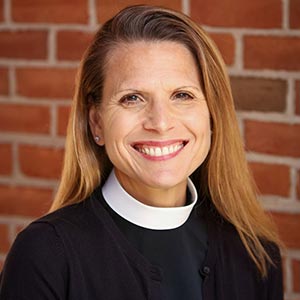
Bridging the Gulf between Man and Man
By The Rev. Kristen Farrington
Upper School Chaplain and Religion Teacher
We have all seen injustice this year, and we cannot unsee what we have seen. We have all heard the cries of anguish this year, and we cannot unhear what we have heard. If we do, we are making a clear choice to be complicit in the status quo.
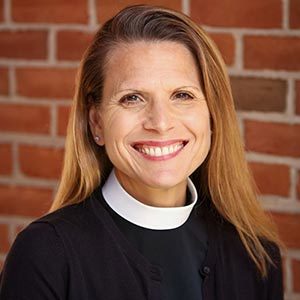 Spring is particularly beautiful this year. The flowering trees and tulips in shades of pink, purple, and bright yellow are breathtaking after such a long, dark winter. Signs of hope are visible everywhere as life slowly begins to feel normal again. Classrooms and halls which were quiet and empty last fall are now full of students, energy, and the sound of laughter. After such a difficult year, there is lingering exhaustion, but there is also a palpable feeling of relief and joy. Is this truly light at the end of the pandemic tunnel? As millions of Americans every day receive the vaccine, it feels like the end of this health crisis is within sight.
Spring is particularly beautiful this year. The flowering trees and tulips in shades of pink, purple, and bright yellow are breathtaking after such a long, dark winter. Signs of hope are visible everywhere as life slowly begins to feel normal again. Classrooms and halls which were quiet and empty last fall are now full of students, energy, and the sound of laughter. After such a difficult year, there is lingering exhaustion, but there is also a palpable feeling of relief and joy. Is this truly light at the end of the pandemic tunnel? As millions of Americans every day receive the vaccine, it feels like the end of this health crisis is within sight.
The COVID-19 pandemic has come with an unimaginable cost, the death of almost 600,000 fathers, mothers, grandparents, children, neighbors, and friends. No one has been left untouched by loss. As restrictions lessen and life begins to feel more normal again, we know that the trauma of losing loved ones, the pain of mental health struggles and economic challenges will continue to impact us for years. Despite all of this, I have faith in our resiliency—I have seen incredible strength in our students and faculty this year. Time and again I have been inspired as the Saints community has navigated this incredibly challenging year. One of the most important times of the week is gathering for Chapel. Week after week, our seniors have spoken of struggle, disappointment, pain and fear, and moments of grace and joy in their Chapel meditations. I have been moved by their incredible wisdom and hope—their voices and perspectives have challenged, motivated, and inspired the whole community.
A few months into the COVID-19 pandemic it became crystal clear that the other pandemic that has plagued our nation for 400 years could no longer be pushed into the shadows, by those who don’t see and believe this part of the American story and by those who have a stake in keeping the status quo. Day after day our inboxes and news feeds are flooded with new victims and horrifying images of violence and senseless death. After the killings of George Floyd and Breonna Taylor that sparked year-long protests, surely noticeable progress would have been made, life-saving reforms instituted, and legislation passed to prevent these senseless deaths from continuing. For black and brown communities in America, racism, xenophobia, police brutality, inequities in health care, violence targeting the AAPI communities, have created a new tidal wave of injustice, tragedy, and unspeakable pain.
In our Upper School Forums, SSSAS students of color have shared their anger and pain knowing that their youth has been stolen from them—they feel they can’t go for a run outside or a drive with their friends without fear of being targeted—just because of the color of their skin. Our faculty of color talk about how fearful they are running errands, taking their children to the playground, and going to bed with the overwhelming fear that their teenage children won’t come home. Despite our DEIB (Diversity, Equity, Inclusion, and Belonging) work at SSSAS and efforts in schools, businesses, and communities across the country, this continued violence, hate, and racism make me honestly wonder whether we’ve moved the needle at all towards equity and justice.
In my New Testament class, I wanted students to see Rev. Dr. Martin Luther King, Jr. as the pastor and spiritual leader of his congregation. I wanted them to understand how his experience of the world impacted his reading of the Gospels and how his deep faith inspired his tireless work for justice. Together we studied Dr. King’s sermon from 1955 about the parable of Lazarus and the Rich Man.
In this parable we meet Dives, a wealthy man who wears beautiful clothes and feasts lavishly every day. Outside his house lives a very poor man named Lazarus, who lays at his gate, covered with sores, and survives by eating the scraps from Dives’ table. Both men die and Lazarus is carried away by angels to be with Abraham. Dives, shocked to find himself in Hades instead of Heaven, calls out to Abraham, “Father Abraham, have mercy on me, and send Lazarus to dip the tip of his finger in water and cool my tongue; for I am in agony in these flames.” But Abraham said, “Child, remember that during your lifetime you received your good things, and Lazarus in like manner evil things; but now he is comforted here, and you are in agony. Besides all this, between you and us a great chasm has been fixed, so that those who might want to pass from here to you cannot do so, and no one can cross from there to us.” Try as he might, Dives works to convince Abraham to help him, but to no avail.
In his sermon, Dr. King asks why Dives is condemned? Dr. King says it isn’t Dives’ wealth that is the problem. There is nothing inherently wrong with wealth and nothing inherently virtuous about poverty. King says that Dives is condemned for three reasons:
First, Dives is so self-absorbed that this prevents him from seeing Lazarus. Dives was presumably a pillar of the community, generous with charities, and revered by all, but every day he walked through his gate so focused on himself that he didn’t even see the man languishing there.
Second, because Dives is so wrapped up in his own life, so self-focused and selfish, he has lost the ability to empathize. Dr. King writes, “There is nothing more tragic than to find a person who can look at the anguishing and deplorable circumstances of fellow human beings and not be moved.” Dives is no longer able to feel compassion for others. He isn’t able to understand an experience different from his own, or to act when he sees injustice.
Third, Dives just assumes that the inequalities in society are the way life is supposed to be: Lazarus is poor because of tragic circumstances and Dives is wealthy because of fortunate circumstances, creating the gulf between the two. King believed that Dives’ sin was not because he made the gulf between the two, but because he believed that the gulf which existed was a ‘proper condition of life.’ Dives didn’t question the inequalities or seek to understand them, he accepted them as part of life.
Dr. King’s powerful words and the speeches and marches that followed inspired people across the nation to come together across race, economic status, religious identity, and party lines to demand change. These efforts resulted in the successful passage of the landmark legislation that prohibited racial discrimination, the Civil Rights Act of 1964, Voting Rights Act of 1965, and the Fair Housing Act of 1968.
As we move towards the end of the COVID-19 pandemic, we must not confuse the end of the health crisis with the end of the pandemic of racism, violence, and oppression. We yearn to return to normal, but normal for black and brown communities means continued racism, injustice, and inequity. We have all seen injustice this year, and we cannot unsee what we have seen. We have all heard the cries of anguish this year, and we cannot unhear what we have heard. If we do, we are making a clear choice to be complicit in the status quo. Sixty-six years after Dr. King preached this sermon, King calls us to ask the same hard questions. Are we so absorbed in our own lives that we don’t see what is right in front of us? Are we so hardened that we can no longer empathize or seek to understand an experience that is different from our own? Are we so absorbed in our own lives that we just assume that inequity and injustice are part of life?
At the end of his sermon, Dr. King reminds us that if we are looking for God, we will find God, bridging the gulf between God and humanity. King believed that we, in turn, are called to bridge the gulf between one another. “As I loved you, so love the brethren.” In other words, God is saying, “As I have bridged the gulf between man and God, so may you bridge the gulf between man and man.” As an Episcopal School and as an Episcopal priest, I believe our work is where God is. At this time in history, this means that we must continue to prioritize our work toward racial justice and equity at school. We must find opportunities to engage in difficult conversations and learn from one another. We must work together to make the long-term, sustainable institutional changes envisioned in the SSSAS Action Steps for Racial Justice.
I believe that everyone has an important role—we can’t expect others to do this work for us. As white allies our role is clear. We have our own internal work to do, but our reflection and growth must be coupled with concrete actions that help move our institution towards racial justice and equity. There are many ways to get involved in this work at SSSSAS. The SSSAS Action Steps for Racial Justice plan is a good place to begin. If you haven’t found a way to support this work at SSSAS, we invite you to join students, faculty, administration, staff, parents, alumni and trustees, as we work together to create a more just and equitable community. We hope you’ll join us, there is a place waiting for you.

